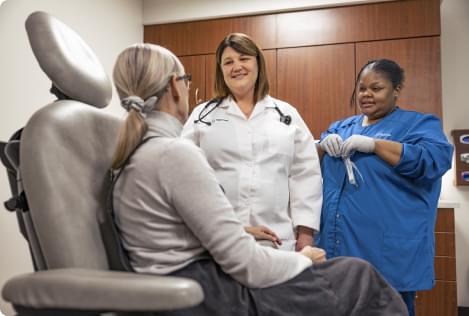Overview
Histoplasmosis is an infection caused by a fungus that's often found in bird and bat droppings. People get the infection by breathing in airborne cells, called spores, from the fungus. These spores often get in the air during demolition, construction or cleanup projects.
When soil tainted by bird or bat droppings is disrupted, it can spread the fungus that causes histoplasmosis. This also puts farmers and landscapers at a higher risk of the disease. In the United States, histoplasmosis is common in Midwestern states in the Mississippi and Ohio river valleys. The disease also occurs in Africa, Asia, Australia, and parts of Central and South America.
Most people with histoplasmosis never get symptoms and don't know that they have the condition. But histoplasmosis can be dangerous for others, mainly infants and people with weakened immune systems. Treatments can help for even the most serious forms of histoplasmosis.
Symptoms
The mildest forms of histoplasmosis cause no symptoms. But serious infections can be life-threatening. When symptoms happen, they often appear 3 to 17 days after someone breathes in the spores that cause the infection.
Histoplasmosis symptoms can include:
- Fever.
- Chills.
- Headache.
- Muscle aches.
- Dry cough.
- Chest pain.
- Tiredness.
Less often, some people also get joint pain and rashes.
A long-term form of histoplasmosis affects the lungs. It's called chronic histoplasmosis. It mainly affects people who have weakened immune systems or underlying lung conditions.
Symptoms of chronic histoplasmosis can include weight loss, a bloody cough and trouble breathing. Chronic histoplasmosis symptoms sometimes seem like those of tuberculosis.
Severe histoplasmosis
The most serious type of histoplasmosis happens mainly in infants and in people with weakened immune systems. It's called disseminated histoplasmosis. It can affect nearly any part of the body. This includes the mouth, liver, brain, spinal cord, skin and adrenal glands. Without treatment, disseminated histoplasmosis often is deadly.
When to see a doctor
Call your healthcare professional if you get flu-like symptoms after being exposed to bird or bat droppings. It's very important to get a checkup if you have a weakened immune system.
Causes
Histoplasmosis is caused by cells, also called spores, from the fungus Histoplasma capsulatum. The spores can float into the air when dirt or other material is disturbed.
The fungus thrives in damp soil that's rich in organic material, especially the droppings from birds and bats. It's common in chicken and pigeon coops, old barns, caves, and parks.
Histoplasmosis can't be spread from person to person. But if you've had the infection, you can get it again. If you do get it again, the illness likely will be milder the second time.
Risk factors
The chances of getting histoplasmosis symptoms rise with the number of spores you breathe in. People more likely to be exposed to the spores include:
- Farmers.
- Pest control workers.
- Poultry keepers.
- Construction workers.
- Roofers.
- Landscapers and gardeners.
- Miners and cave explorers.
- Demolition workers.
- Oil and gas extraction workers.
People most at risk of severe infection
Children younger than age 2 and adults age 55 and older have weaker immune systems. Because of this, they're more likely to get the most serious form of the disease, called disseminated histoplasmosis. Other factors that can weaken the immune system include:
- HIV or AIDS.
- Cancer chemotherapy.
- Corticosteroid medicines such as prednisone.
- Medicines called tumor necrosis factor inhibitors, which often are used to control rheumatoid arthritis.
- Medicines that prevent the body from rejecting a transplanted organ.
Complications
Histoplasmosis can cause many serious health conditions, even in otherwise healthy people. Infants, older adults and people with weakened immune systems can get complications that often are life-threatening.
Complications can include:
- Acute respiratory distress syndrome, also called ARDS. Lung damage from histoplasmosis can lead to this condition. ARDS happens when air sacs in the lungs start filling with fluid. This keeps the lungs from getting enough air. As a result, less oxygen gets into the blood.
- Heart concerns. The body's defenses may react to the spores that cause histoplasmosis by creating too much swelling, also called inflammation. If the tissue that surrounds the heart becomes inflamed, it's a condition called pericarditis. Fluid may build up in the tissue as a result. When that happens, the heart can have trouble pumping blood.
- Adrenal insufficiency. Histoplasmosis can harm the adrenal glands. That can cause the glands not to make enough of certain key hormones. This condition is called adrenal insufficiency. You also might hear it called Addison's disease.
- Meningitis. Meningitis is an infection of the fluid and thin sheets of tissue that surround the brain and spinal cord. Sometimes histoplasmosis causes meningitis.
Prevention
It can be hard not to breathe in the spores that cause histoplasmosis. That's especially true in areas where the fungus is widespread. But you can take the following steps to help lower the risk of infection:
- Limit exposure. Stay away from projects and activities that might expose you to the fungus. These include cave exploring and raising birds, such as pigeons or chickens.
- Call professionals for cleanup if needed. If you live in an area with lots of bird or bat droppings, it's risky to clean up the droppings yourself. Instead, call a company that removes hazardous waste.
- Take safety measures at work. If your job involves working in an area where the fungus that causes histoplasmosis is common, talk with your employer. Ask if there's a site safety plan to lower the risk of infection. Also ask if your employer offers training to help you protect yourself from getting histoplasmosis.
- Spray surfaces that might be tainted. Before you dig soil or work somewhere that could harbor the fungus that causes histoplasmosis, soak the area with water. This can help prevent spores from being released into the air. Spraying chicken coops and barns before you clean them also can lower your risk.
- Wear a respirator mask. Check for guidance on masking from your country's agency for work safety and health. The agency may be able to tell you which type of protective mask would be right for your level of exposure.
Diagnosis
To find out if histoplasmosis is the cause of your symptoms, your healthcare professional gives you a physical exam. You're asked about your medical history and whether you've recently gone to a place where the disease is common.
Your healthcare professional may recommend one or more of the following tests as well:
- Blood or urine tests.
- Tests of a saliva and mucus sample coughed up or removed from the lungs.
- An imaging exam such as a chest X-ray or a CT scan of the lungs.
- A procedure to remove a small piece of lung tissue, called a biopsy.
- Bone marrow tests.
Treatment
Most often, treatment isn't needed for mild histoplasmosis. But if your symptoms are serious or if you have chronic or disseminated histoplasmosis, you'll likely need treatment. This involves taking one or more medicines that treat infections caused by fungus. These medicines are called antifungals. If you have a serious form of the disease, you might need to keep taking medicines for three months to a year.
Preparing for your appointment
You're likely to start by seeing your primary healthcare professional. Then you might be referred to a specialist in infectious diseases. Depending on your symptoms and how serious your infection is, you also might see other healthcare professionals. These could include a lung specialist called a pulmonologist and a heart specialist called a cardiologist.
What you can do
Make a list of:
- Your symptoms. Include any that don't seem related to the reason for your checkup. Note when your symptoms began.
- Key personal information. Include whether you've been to areas where you might have been exposed to the fungus that cause histoplasmosis. For example, mention if you've been to places with lots of birds or bats.
- All medicines, vitamins or other supplements you take. Include the amounts you take, called the doses.
- Questions to ask your healthcare professional.
For histoplasmosis, questions to ask your healthcare professional include:
- What's the most likely cause of my symptoms?
- How could I have gotten this infection?
- What tests do I need?
- Will I need treatment and, if so, which do you recommend?
- What side effects can I expect from treatment?
- I have other health conditions. How can I best manage these conditions together?
- Are there printed materials I can have? What websites do you recommend?
What to expect from your doctor
Your healthcare professional likely will ask you questions such as:
- Do you have symptoms constantly or once in a while?
- How serious are your symptoms?
- Do you work outdoors?
- Have you spent time in areas with a lot of birds?
- Have you spent time in caves or other areas where bats might live?
© 1998-2026 Mayo Foundation for Medical Education and Research (MFMER). All rights reserved. Terms of Use


